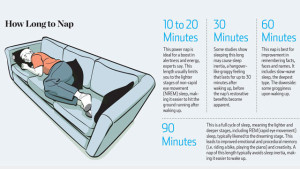 As a college student, I definitely find myself taking more naps. It’s difficult getting the right amount of sleep while finding enough time to study. The solution is to take naps throughout the day, but napping the right amount of time is important to maintaining a normal schedule. So what is the appropriate amount of time to take a nap?
As a college student, I definitely find myself taking more naps. It’s difficult getting the right amount of sleep while finding enough time to study. The solution is to take naps throughout the day, but napping the right amount of time is important to maintaining a normal schedule. So what is the appropriate amount of time to take a nap?
Leon Lack, a psychology professor at Flinders University in Australia, conducted a study in 2006 to answer this question. The study observed 24 people, each napping from a range of 30 seconds to 30 minutes. The participants in the study were observed after each individual nap and given different mental processing tasks. Lack found the 10 minute nap to be the most effective. After 10 minutes, it was obvious that the participants were more alert and awake. The effect lasted for two and a half hours. However, after the 20-30 minute nap, the participants were not as energized and remained tired up to 30 minutes after the nap. This study should specifically state when the participants took these naps. For example, if they took a 20-30 minute nap right after the 10 minute nap, the results could be altered because the body and brain is given insufficient time to recover between the naps. The time in which the participants are napping could intersect with each other meaning a 20 minute nap could potentially be a 30 minute nap if it was taken right after the 10 minute nap.
Although a 10 minute nap is the most effective nap, more or less time are also effective depending on what results you want. Depending on how long your nap is, your brain gives off different results through the different stages. According to WebMD, there are three general stage of naps, and each has unique benefits. A 10 to 20 minute power nap, also known as stage 2, is the most effective nap. This gives you a quick boost, and makes you feel more energized when you wake up. The benefits of taking a short power nap is that it increases alertness and improves learning skills. The second option is taking a 30 to 60 minute nap. This doesn’t give you as big of an energy boost as a twenty minute nap, but it helps improve your memory and decision making skills. When you take a nap longer than an hour, you hit the REM stage of naps. REM, also known as rapid eye movement, happens when we are in deep sleep. REM sleep activates your brain and allows you to dream. The significant difference between 60 to 90 minute nap and the others is that the other two stages are non-REM sleep.
While napping may have positive effects, napping may not be for everyone. Some people may have trouble falling asleep during the day, while other may have trouble waking up from naps too. According to Mayo Clinic, napping can have negative effects such as sleep inertia and nighttime sleep problems. Some people experience sleep inertia, which makes you feel extra tired when waking up from a nap. Others may have trouble sleeping at night and may experience insomnia.
Overall, naps are good for your health and maintaining a good schedule. It is definitely okay to take a nap once in a while, you just have to make sure you are napping for the right amount of time.


I agree with the points made in your post. It’s pretty clear through my own trial and error that less time for naps is better, because anything longer than 90 minutes for a nap just results in me becoming very groggy and disorientated. This article does a good job explaining napping.
http://www.theguardian.com/lifeandstyle/2009/jan/27/napping-guide-health-wellbeing
This blog is very interesting to me because I take a nap almost every day. Even if I don’t plan on it, I usually end up falling asleep for at least an hour. I have heard before that any nap over an hour does more harm than good, but I always found it hard to believe. Common sense tries to tell me that a 3 hour nap is better than a 30 minute nap. However, your research may prove that incorrect. The research you have contributes well to your argument and the studies correlate with your ideas. I think it would be good for more research to be done on this topic because it seems like it could be very beneficial.
I find your blog pretty interesting. I always take a nap for I always feel tired but after read your blog, I know the most scientific time for a nap. I agree with your points about the length of naps. The research you mentioned is well conducted and comprehensive and supports your statement as well. But it may be affected by third variables like chance so further researches should be made. But I like you blog!